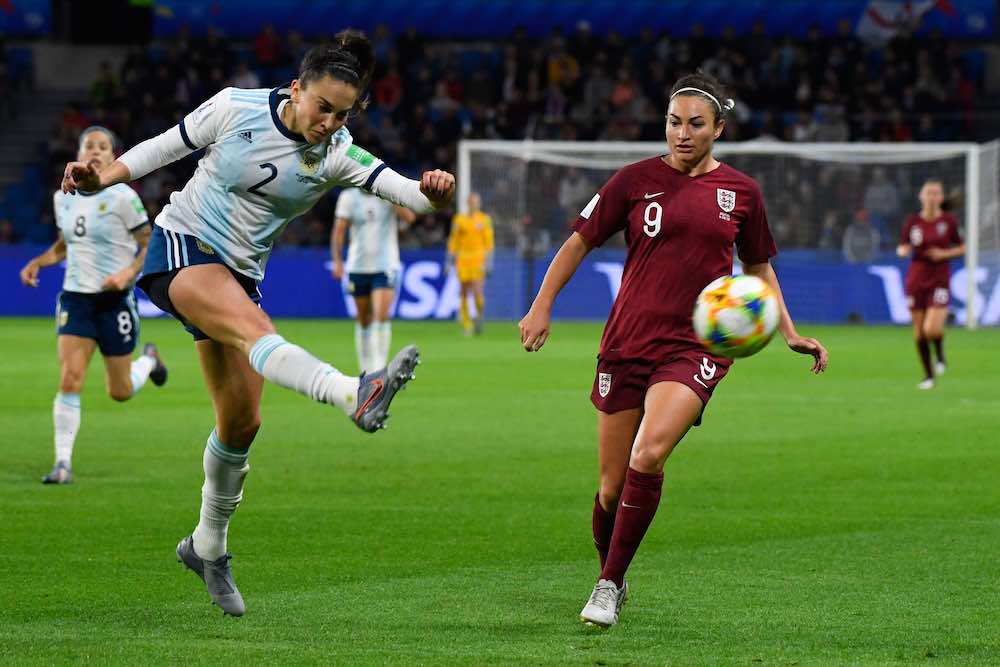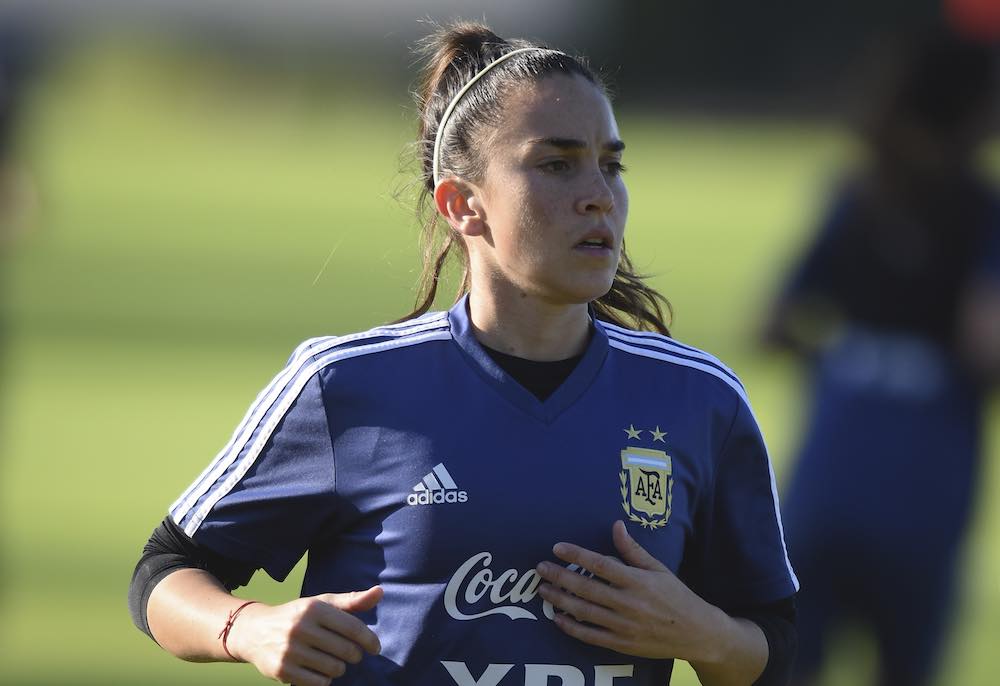By Louis Smith.
After a 13 year hiatus, Argentina took part in their fourth FIFA Women’s World Cup in 2019 and among their squad was defender Agustina ‘Agus’ Barroso.
Barroso began her senior football career in 2011 aged just 17 playing for UAI Urquiza, who play 221 miles away from her local city of Tandil, where her journey to becoming a professional footballer began.
“My parents are both physical education teachers, so in my house, there was always a ball, whether it be a basketball, football, or paper ball,” Barroso wold WFi.
“Sport has been around since I was a child, the first memories of playing sport as a child was with my brother in the garden of my house.”
Barroso spent five years playing for the Greater Buenos Aires club, lifting two major honours. First in 2012, UAI Urquiza ended the dominance of Boca Juniors and River Plate by lifting the Primera División Torneo Clausura title in 2012. Then two years later, in a new format, UAI Urquiza earned their second domestic title.
Her performances were quickly recognized by others as she made her debut for the Argentina national team in 2011 and was awarded Argentina Women’s Player of the Year in 2014.
“I consider UAI Urquiza my home, as it was the first team I played for and the only team I played for in Argentina, so I have a lot of respect and affection for the club,” she says.
“When I got there the conditions weren’t the best, but the club was always available to improve. Today it is one of the best teams in Argentina, and this shows a lot about how the structure and football has evolved.
“Winning those two championships for me was very special mainly because they were the first ones we won. Being a part of the club’s history is something I’ll take forever.”
In 2016, Barroso took her career to a new country by joining Ferroviária of Brazil, but would only go on to play a handful of games before making a move to not only to another country but to a new continent by joining English side AFC Fylde.
ICYMI | Argentina international Agustina Barroso joins @FyldeLadiesFC | Full story: https://t.co/aORnfncAH4 pic.twitter.com/CbzWXsmPcE
— AFC Fylde (@AFCFylde) July 14, 2016
“The year of 2016 was a year of total transition, mainly because it was the first time I left Argentina,” Barroso explains.
“It was a time that I had to adapt to a new culture, new customs, so it was a year of transition and adaptation as well.
“Ferroviaria was a club where they received me very well, I have the best memories of there.
“Then, as everybody knows, football in Europe continues to evolve and I chose to leave for England because this is a great possibility to leave South America for Europe, and this was a great challenge.
“The fact that England is a power in the world drew a lot of attention and I wanted to play there.”
Barroso not only had to adapt to a new language, culture, and climate, but she also had to deal with a change in the style of football compared to what she was used to.
“The main difference that I found when I arrived was in the physical side, it’s a much faster football,” she says of her time in Lancashire.
“I had to get much stronger, and at first, the adaptation was difficult but I managed to get into the rhythm and play my game.
“I also think that this time in England has made me grow a lot physically and mentally.
“My stay in England I consider a short but very intense, I learned a lot from there and it is a place I would return to.”
After leaving Fylde in 2017, Barroso spent time in Spain and Brazil before the 2019 World Cup where she did enough to earn a place in the showpiece event.
La Albiceleste went into the tournament knowing that in the three previous World Cups they had qualified for, they were yet to pick up a point. But this was a completely new group of hungry ambitious players determined to showcase their talent on the global stage.
When the draw was made in December 2018, Argentina was placed with 2011 winners Japan, an England side considered one of the favourites for the tournament, and debutants Scotland.
Going into their first game with Japan, Argentina was considered huge underdogs but Barroso and her teammates defied the odds by earning a 0-0 draw. it was their first-ever point in a World Cup.
Next up was England, and despite a resilient effort, Argentina suffered a 1-0 loss. However, there were still plenty of positives the South Americans could take going into their final game with Scotland.

Argentina defender Agustina Barroso (L) vies for the ball with England forward Jodie Taylor during the women’s World Cup match between England and Argentina, on June 14, 2019, at the Oceane Stadium in Le Havre, France.
Both sides had a chance of progressing to the knockout stages of the tournament and just 19 minutes in Scotland took the lead through Arsenal’s Kim Little.
After the break, things would worsen for Argentina as goals from Jen Beattie and Erin Cuthbert put the Scots 3-0 up with just 20 minutes left.
La Albiceleste were not throwing in the towel just yet, though, and within the space of ten minutes, a Milagros Menéndez goal and an own goal from Lee Alexander had given them a glimmer of hope.
With the game going into the final minutes, Scotland looked like they were about to hang onto an important three points, that was until a Sophie Howard foul on Aldana Cometti saw North Korean referee Ri Hyang-ok point to the spot after consultation with the video assistants.
Florencia Bonsegundo held her nerve as Argentina completed a memorable comeback to earn a point that ensured they would not finish bottom of the group.
It was a bittersweet moment for the Argentines. The result meant they finished third but they still missed out on qualification to the knockout rounds due to not being one of the four best third-placed teams.
Despite this, it was certainly a tournament Argentina could be extremely proud of.
“Playing in the World Cup was incredible,” Barroso says of that tournament. “It was a dream I always had and being able to be present at that moment, in a World Cup as remarkable as this one, it was a feeling that sometimes we try to convey but we can’t. But at the same time, I can say that it was a very happy moment in my career.
“The game [against Scotland] was crazy, being on the field in this game was a mixture of emotions.
“Losing 3-0 and after we managed to recover, the atmosphere, the crowd, the stadium, it was an exceptionally beautiful, exciting moment and I think it will be engraved in the memory of all of us.”
Since the World Cup Barroso has gone from strength to strength. In 2020 she joined Brazilian giants Palmeiras. Her debut season saw her play 21 times as she adapted to new surroundings once again.
“I consider that my first season was good, also knowing that it was a year of adaptation again in a new club,” she says of the move.
“Thank God I was already able to speak the language correctly, but I had to understand the new idea of Ricardo José Belli’s game, which was a very energetic idea. He made the defenders be dynamic and participate more in the release of the ball and the construction of the game.
“I think my first year at Palmeiras was a year of conquest for having got the position and fighting for it and being able to be in an ideal team, for me it was a very positive season.”
Last year saw an even better season for the Barroso who featured 32 times for Palmeiras, scoring five and providing two assists for her teammates.
Not only that, but her performances saw her included in the Brasileirão Feminino Team of the Year — a remarkable achievement.
@BRFeminino ⚽️🇧🇷🇦🇷 pic.twitter.com/dyF6EbCIYQ
— AgusBarroso (@AgusBarroso5) February 27, 2021
“As an athlete we always have dreams, we work to conquer them,” she concludes. “Next year there will be an international championship, the Copa America, which is particularly important, and this Copa America qualifies you for the World Cup and Olympics.
“I am with plenty of heartfelt desire to be able to qualify for the World Cup and an Olympics, which is a championship every athlete is aiming for, so these are my dreams and I hope I can achieve them.”


COMMENTS